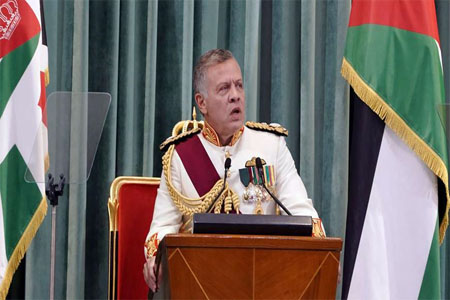
Amman - Afrasianet - Jordan has embarked on a comprehensive political reform endeavour that has seen major constitutional changes and legislative amendments declared by officials and endorsed by lawmakers as key to the envisioned change.
The constitutional amendments went into effect in 2011, followed by new parliamentary elections, political parties, municipalities and decentralisation laws. The declared goal was to lay the foundations of a progressing political reform process aimed at expanding Jordanians’ participation in the decision-making process and, as put by His Majesty King Abdullah, “achieving them [a] better future”.
Meeting with a group of young Jordanians from various sectors in 2011, the King said: “We are moving ahead with the reform process. There is nothing to fear as we believe that reform is the key to a better future for all Jordanians.”
In 2011, Parliament passed changes to 42 articles of the 1952 Constitution proposed by the Royal Committee on Constitutional Review.
The constitutional amendments centred on the separation of the judicial, legislative and executive authorities, as well as the complete independence of the judiciary.
The major amendments included the establishment of a constitutional court that meets the highest international standards and the formation of an independent commission to oversee the elections.
In a bid to further protect human rights, the new version of the Constitution prohibits the trial of civilians in any court where all the judges are not civilians. As for the State Security Court, which the opposition groups have been calling for abolishing, its mandate was limited to trying defendants indicted for one of three charges: terrorism, espionage and treason.
In June 2015, Parliament passed new Political Parties Law under which the number of founding members was reduced to 150, instead of 500, with the minimum age of membership eligibility lowered to 18 from 19.
The Political Parties Law grants political parties the right to have their own investments, which should be in the Kingdom, provided that they are announced in periodical publications or media outlets.
Political parties are not allowed to receive gifts, funding or cash donations from other countries and external agencies and are prohibited from having organisational or financial affiliations with non-Jordanian organisations.
A new elections law was passed in February 2016, under which the one-person, one-vote electoral system, which was introduced in 1993, became redundant. The new law is based on the at-large voting system, in which candidates can run for parliamentary elections on one large multi-member ticket.
The number of Lower House members was reduced to 130 from 150 under the 2016 elections bill, which is based on the open proportional list at the level of the governorate/constituency.
Under Article 9 of the 68-article law, eligible voters will have a number of votes equal to the number of seats allocated for their district in the Lower House.
In August 15, 2017, Jordanians elected mayors and members of local and municipal councils in the local twin elections conducted in accordance with the new municipalities and decentralisation laws.
Jun 08,2019

